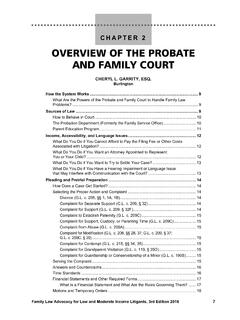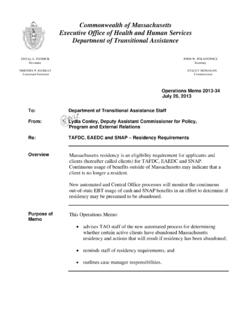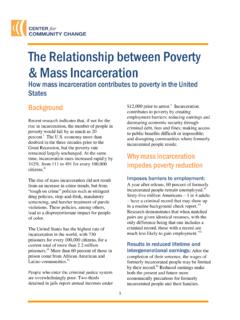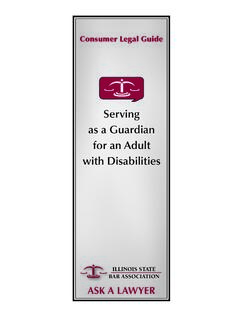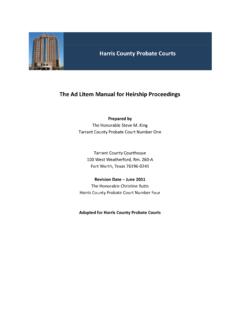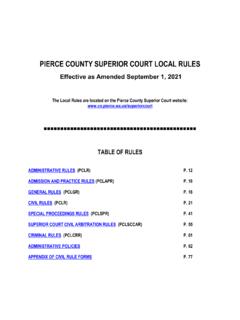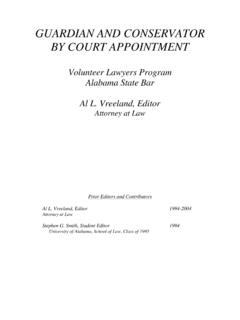Transcription of GUARDIAN AD LITEM - Mass Legal Services
1 Family Law Advocacy for Low and Moderate Income Litigants, 3rd Edition 2018 305 CHAPTER 10 GUARDIAN AD LITEM COURTNEY M. HOSTETLER, ESQ. South Costal Counties Legal Services , Inc., Fall River JAMIE A. SABINO, ESQ. Massachusetts Law Reform Institute, Boston What Is a GUARDIAN ad LITEM ? .. 305 Deciding Whether to Seek a GAL .. 307 Getting a GAL Appointed, and Payment of the GAL .. 307 How to Participate Effectively in the GAL Investigation or Evaluation of Your Case .. 309 General Requirements .. 309 At the Beginning .. 309 Meeting with the GAL .. 310 Throughout the Investigation/Evaluation .. 311 Reading and Challenging the Report .. 311 Your Rights During the GAL Investigation or Evaluation .. 312 Confidentiality .. 312 Safety .. 313 Impermissible Dual Roles .. 313 Other Requirements of the GAL Investigation.
2 314 GAL Complaint Process .. 315 EXHIBIT 10A Standards for Category F GUARDIAN ad LITEM / Investigators .. 316 EXHIBIT 10B Standards for Category E GUARDIAN ad LITEM / Evaluators .. 330 EXHIBIT 10C Motion to Appoint GUARDIAN ad LITEM Under c. 215, 56A .. 351 WHAT IS A GUARDIAN AD LITEM ? If you are involved in a Probate and Family Court child custody and visitation case, you may hear the phrase GUARDIAN ad LITEM (GAL). A GAL is a person who can be assigned by the court to investigate and/or evaluate the child, the child s family, and the child s home life; and to share findings with the judge. A GAL either can be appointed by the judge, or the parties might agree that a GAL should be appointed to the case. Typically, a GAL is appointed where the parents cannot work out a custody and visitation plan on their own; or if one or both parents have raised serious issues about the parenting capacity of the other (usually these issues involve allegations of child abuse or neglect, addiction, or mental illness so severe that the parent cannot care for the child).
3 There are several different types of GALs. Most of the time, the court will appoint a GAL/investigator or a GAL/evaluator. The GAL/investigator often is an attorney with experience in representing parties in custody and visitation cases, although sometimes mental health professionals are appointed as GAL/investigators. The GAL/investigator gathers CHAPTER 10: GUARDIAN AD LITEM 306 Family Law Advocacy for Low and Moderate Income Litigants, 3rd Edition 2018 and analyzes the facts of the case and makes a report, but does not conduct mental health assessments (such as clinical interviews, mental health testing, or analysis that draws on expertise from the mental health field). The GAL/investigator is also referred to as a Category F GUARDIAN ad LITEM . The Standards for Category F GUARDIAN ad LITEM /Investigators are included as Exhibit 10A.
4 The GAL/evaluator is always a mental health professional who both investigates the facts of the case and evaluates those facts using his or her mental health expertise. The GAL/evaluator is also referred to as a Category E GUARDIAN ad LITEM . The Standards for Category E GUARDIAN ad LITEM /Evaluators are included as Exhibit 10B. GAL/investigators and GAL/evaluators or any other kind of GAL that might be assigned to your case should be independent (neutral) investigators who examine several aspects of the child s life. The GAL talks to the child s parents, usually to the child himself or herself, and often to other adults living in the home. The GAL typically visits the homes of each of the parents and observes the child interacting with each parent. The GAL also talks to other people, particularly professionals, who know the child and/or the parents well or work with the child.
5 These professionals include teachers, doctors, therapists or other counselors, and sometimes people such as coaches, Scout leaders, or others involved in the child s life. The GAL also reviews documents relevant to the custody and visitation issues the court must decide. After the GAL finishes gathering this information, he or she writes a report that presents the facts, analyzes the facts, and, in some cases where the judge has made the request makes recommendations about custody and visitation. The GAL files the report with the court. The judge then reviews the report at a hearing and/or considers it as evidence at a trial along with the GAL s testimony. This chapter focuses on the GAL/investigator or evaluator. However, there are many other types of GALs, and it is possible that the judge in your case could appoint another type of GAL either instead of or in addition to the GAL/investigator or evaluator.
6 These other types are as follows: Probate and Family Court Probation Department or Court Clinic Investigation. In some cases, particularly if neither party can afford to pay for a private GAL/investigator or evaluator, the court may appoint the Probate and Family Court Probation Office to conduct a brief investigation. Some courts also have court clinics that perform a similar function. Note that Probate and Family Court probation officers do not play the same role that probation officers play in criminal courts, but instead deal with family court cases only. See chapter 2 of this book on the role of the Probate and Family Court Probation Office. Many of these probation officers are experienced in custody and visitation matters and conduct effective investigations. GUARDIAN ad LITEM /Next Friend. In some cases, a judge might appoint a GAL/next friend for a child.
7 The role of the GAL/next friend is different from that of the GAL/investigator or evaluator because the GAL/next friend represents the best interest of the child. This means that the GAL/next friend acts as an attorney who advocates for what he or she has determined is in the child s best interest. GAL/investigators and GAL/evaluators do not advocate for the child; instead they are neutral parties who provide information to the court about what they observed during their investigations or evaluations. A GAL/next friend also plays a different role than an attorney for the child. An attorney for the child advocates for what the child wants (or, when the child is too young to state a preference, for what the attorney believes the child would want), but the GAL/next friend advocates only for what they have determined to be in the child s best interest, regardless of what the child might say they want.
8 The role of the attorney for the child is a highly controversial and hotly debated issue. Note that some counties also have a program known as Attorneys Representing Children (ARC). An attorney appointed under this program represents what the child wants, or would have wanted if he or she were not too young to state a preference. GUARDIAN ad LITEM to Waive the Child s Privilege. A GAL may be appointed specifically to determine whether to waive the child s privilege with a therapist or counselor. Parents, the parents attorneys, and GAL/investigators and GAL/evaluators do not have automatic access to a child s privileged communications with therapists and counselors. The communication remains confidential unless and until it is waived. This privilege can be waived only if a different GAL an attorney specially appointed for the limited task of determining whether privilege should be waived determines that waiver is appropriate.
9 The role of the GAL to waive the child s privilege is discussed in more detail in Confidentiality, below. Parenting Coordinator. A parenting coordinator is not technically a GAL, but it is described here because there is some overlap with the GAL role. The parenting coordinator s role is set out in Probate and Family Court Standing Order 1-17. While a case is open, or even after it has been closed, parents may agree to engage a parenting coordinator, or some judges may appoint a parenting coordinator as long as both parties have consented to pay the coordinator s fees. Parenting coordinators help parents resolve disputes about CHAPTER 10: GUARDIAN AD LITEM Family Law Advocacy for Low and Moderate Income Litigants, 3rd Edition 2018 307 how to implement or comply with a custody order or judgment. They typically focus on mediating disputes over issues that are not specifically covered by the custody order or judgment.
10 While parenting coordinators may sometimes help parents come to an agreement about issues that require modification of an order or judgment, these agreements must be brought to court and formally added to the order or judgment. Importantly, parenting coordinators cannot help parties reach agreements that would change Legal custody or physical custody in a way that affects child support. There are a few things to bear in mind before asking for, or agreeing to, a parenting coordinator. A parenting coordinator is likely not appropriate if you have a history of domestic violence (see chapter 3, Safety and Protection Issues, and chapter 19, Mediation), and the court cannot require you to use a parenting coordinator if you or the opposing partner has been victim of, or accused of, domestic violence. Also, be wary of any agreement for a parenting coordinator that would give the parenting coordinator the final decision-making authority over disputes.
